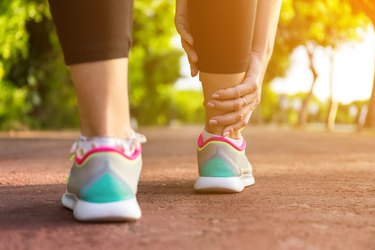
For many people, summer days bring memories of barbecues, pools, beaches and lazy afternoons. But summer weather can also lead to heat edema, the term for when your body swells in the heat due to water retention.
Heat edema can be especially obvious in your lower extremities due to the effects of gravity, which is why you may have wondered why your legs or ankles swell in hot weather. Although usually temporary, this swelling may be uncomfortable, and, in some situations, it may require medical attention.
Video of the Day
Video of the Day
So if you've been wondering why you swell up in the heat, here are the reasons why and how to treat swollen ankles and feet. Plus, learn the differences between heat edema and edema caused by other conditions.
Why Heat Edema Happens
So, why do your legs or feet swell in the heat?
Heat may cause swelling because it can temporarily dilate (widen) your blood vessels, causing fluid to pool in your legs, feet, hands and fingers, according to the University of Michigan. This extra fluid can make your skin look tight and shiny.
A common symptom of heat edema is when an indentation (pit) remains after you press your finger into your swollen skin for several seconds.
Heat edema is more likely to happen when you're not used to hotter temperatures, according to the Mayo Clinic. Beyond that, the following things can cause edema or make it worse, per the Mayo Clinic and Cleveland Clinic:
- Standing or sitting in one place for too long
- Too much salt in your diet
- Pregnancy
- Having premenstrual symptoms
- Some medications, including those to control blood pressure, diabetes or pain as well as drugs with steroids or estrogen
- Certain diseases, such as kidney, liver, lung or thyroid disease, or congestive heart failure
- Venous insufficiency, a condition where the valves of the veins in the legs become weaker
- Cirrhosis (liver scarring caused by long-term liver damage)
- Severe, long-term protein deficiency
- Deep vein thrombosis (a blood clot in one or more deep veins, usually in the legs)
- In rare cases, low vitamin B12 may be associated with edema, per a February 2016 study in IOSR Journal of Dental and Medical Sciences.
But even active folks with no underlying medical conditions may be at risk for heat-related swelling — especially swollen ankles and feet swelling in the heat — if they have limited access to air-conditioning or do intense outdoor workouts in high temperatures.
How Long Does Heat Edema Last?
Typically, mild edema — which is usually the case if your hands and feet swell in heat — goes away on its own once you cool down, especially if you elevate the affected area above your heart, per the Mayo Clinic.
However, if edema persists for a few days, visit your doctor to see if something other than heat is to blame, according to the National Health Service.
How Is Edema Diagnosed?
If you have edema that doesn't go away quickly (i.e., types other than heat edema), your doctor can use a grading scale to diagnose the severity of your condition.
The edema grading scale measures how quickly the indentation (pit) made in your skin by a finger returns to normal. Here are the levels, per the Cleveland Clinic:
- Grade 1: Immediate rebound with two millimeter pit
- Grade 2: Less than 15-second rebound with 3 to 4 millimeter pit
- Grade 3: Rebound greater than 15 seconds, but less than 60 seconds with a 5 to 6 millimeter pit
- Grade 4: Rebound between 2 to 3 minutes with an 8 millimeter pit
How to Treat Heat Edema
There are some quick ways to shrink swollen feet. These include the following, per the Cleveland Clinic:
- Wearing compression socks
- Taking an epsom salt bath
- Elevating your feet and legs (with a pillow or against the wall)
- Eating magnesium-rich foods
While heat-related edema will typically go away after taking these steps, edema caused by an underlying condition may take longer to subside.
How to Prevent Foot Swelling in Hot Weather
To prevent heat-related swelling, keep out of extreme temperatures as much as possible. The best way to avoid heat edema is to keep cool. Staying in a cool environment can minimize the dilation of blood vessels and help prevent fluid retention in the legs, per the Mayo Clinic.
If that's not possible, try the following:
- Drink plenty of fluids to prevent dehydration. Drinking water isn't considered the first line of defense to treat edema, but it's always helpful to make sure you're properly hydrated
- Take frequent breaks to cool down and gradually acclimate yourself to the weather
- Avoid prolonged sitting or standing when possible, as staying sedentary can cause swelling in the feet, ankles and legs
- Avoid or limit foods that cause swelling in legs (i.e., salty foods)
- Take medication as prescribed by your doctor
- Stay active — make sure to engage in movement that improves circulation, including biking, walking, etc.
- Visit a vein specialist, if recommended by a doctor
Tip
Swollen feet after walking in the heat is common, per Harvard Health Publishing. To treat it, seek out a cool room where you can rest and elevate your feet to bring down the swelling.
When to See a Doctor
Edema in the legs can typically be relieved with home remedies, per the Mayo Clinic. Elevating the legs counters the effects of gravity on the feet, ankles and legs, helping with normal blood and fluid flow. Brief walking and gentle leg movements may also help ease the swelling.
While swelling in the feet and ankles during a heat wave usually isn't a major medical concern, it could be a sign of a more severe form of heat-related illness, such as heat exhaustion or heatstroke, per the Cleveland Clinic.
And if your swelling is triggered by a medical condition, talk to your doctor about the best ways to relieve edema.
Warning
Call your doctor immediately if you have a sudden increase in swelling, swelling develops in only one leg or if you have edema for no apparent reason. Call 911 or seek immediate medical care if you have swelling along with any trouble breathing or chest pain, per the Mayo Clinic.
- Mayo Clinic: "Edema"
- University of Michigan: "Heat Edema (Swelling)"
- Cleveland Clinic: "Edema"
- Harvard Health Publishing: "What’s causing those swollen feet?"
- National Health Service: "Swollen ankles, feet and legs (oedema)"
- Cleveland Clinic: "Heat Exhaustion"
- Mount Sinai: "Foot, leg, and ankle swelling"
- National Academies of Sciences, Engineering and Medicine: "Report Sets Dietary Intake Levels for Water, Salt, and Potassium To Maintain Health and Reduce Chronic Disease Risk"
- Cleveland Clinic: "Swollen Feet and Ankles: Treatments to Try"
- Journal of Dental and Medical Sciences: "Vitamin B-12 deficiency presenting as bilateral pedal edema; Physiological role of vitamin B-12 in maintenance of vascular smooth muscle tone"
Is this an emergency? If you are experiencing serious medical symptoms, please see the National Library of Medicine’s list of signs you need emergency medical attention or call 911.


